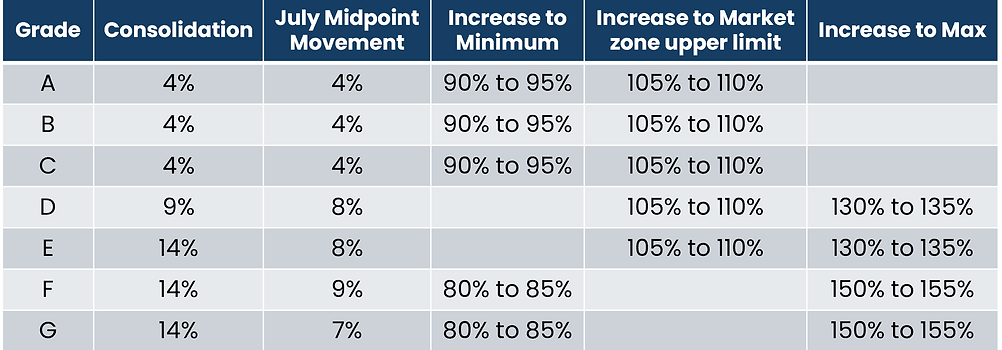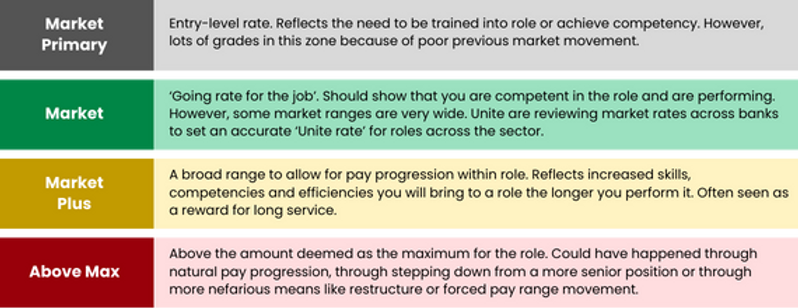

THE HEADLINES
We have tried to simplify the proposals in terms of the below summary. However, the various elements add a complexity to highlighting what it means. That is why we encourage you to read the grade breakdown details to see in more detail what this overall proposal means for you.
Some of your non-consolidated reward will become consolidated from the 1st July. This has been a Unite ask for a number of years and we are happy that colleagues are going to be able to take advantage of this.
All grades will see their flex cash allowance consolidated into their salary, which means this will count towards your GPS calculation, your pensionable pay (for those on a DC pension scheme) and towards financial products like mortgage applications.

Grades D-G will then also have part of their GPS consolidated into their core salary. This means that effectively you will see most of your GPS that you may have expected in March-June 2024 in monthly instalments between July 2023-June 2024. This guarantees that part of your GPS and leaves less to uncertainty. Grades D and E will fall into the same GPS approach from 2024 that Grades A-C have been on since the introduction of Your Best.
Unite campaigned and demanded the bank do right by colleagues on the back of the unprecedented pay deal that we all secured together and increase the pay range mid-points by the amount of consolidation for each grade. Your mid-point decides where you are within the pay range (market primary/market/market plus/above max) and this can lead to decisions in your annual pay, promotion pay rises and lateral move pay rises. As a result, we have secured movement to all mid-points, and also some extra movement which will lower the amount of colleagues not receiving pay rises. See below for an example pay group and where the ranges may sit .

Pay ranges overview
Pay ranges are how the bank determine that they are paying the right rate for a job. The bank decide a rate that is reasonable and this is then the mid-point for the role. This is classed as the '100%' part of the range. Between 95% and 105% of the mid-point is the 'market' range for Grades A to E, and each range will have a minimum (spanning from 80% to 90% of the mid-point currently, depending on your Grade) and a maximum (spanning from 130% to 150% of the mid-point currently, depending on your Grade).

The mid-point movements are subject to annual acceptance by union members and traditionally move at a pace similar to the annual pay rise. This ensures that colleagues don't move 'too quickly' through the pay zones and are able to receive a decent pay rise each year. In previous years, your pay rise has been based on your position in the market range. This means that the lower in the range you are, the more you got in terms of a pay rise. Unite have always opposed this way of awarding pay rises as it pits workers against each other.
What we call 'Market Movement' is just the term for what is added to the mid-point, causing a domino effect and increasng the other parts of the range. For example, a zone at Grade A-C with a mid-point of £27,000 will have a Market Primary range of £24,300-£25,649, a Market range of £25,650-£28,349, a Market Plus range of £28,350-£32,349, and anything from £32,350 and over is classed as Above the Maximum.
£27,000
£25,650
£24,300
£28,350
£32,349


Grade Breakdown
Consolidation
Market Range
Market Zone
Overnight salary increase of 4% (calculated at 30 June) - this will be higher than your current flex allowance but colleagues have told us that most of this will not be 'new money'
GPS amount is based on salary so in essence if you were awarded the same percentage GPS next year as you were this year, your award would be even bigger (assuming GPS set at 5%)
Pension contributions are based on salary so both yours and the bank's pension contributions will increase if on the Your Tomorrow scheme
Ability to take higher salary into consideration for things like mortgages
Previously you had to be competent at your role and be in role for 6 months to reach 95% of the range. Now you will start there overnight
Potential real pay rise of £4,000 overnight for colleagues in this position
Removal of the "bring to market" qualifier which used to hang over colleagues' heads when they started a new role
Previously the 'Market Zone' part of the pay range ran from 95% of the mid-point to 105%
This will now run from 95% to 110% meaning that some people will drop down from 'Market Plus' into 'Market', increasing their chances of a higher pay rise if the bank use your position in the range as a qualifier for your pay rise (typically, the lower you are in the pay ranges, the higher the percentage pay rise you would receive).
Unite rates LBG's performance



